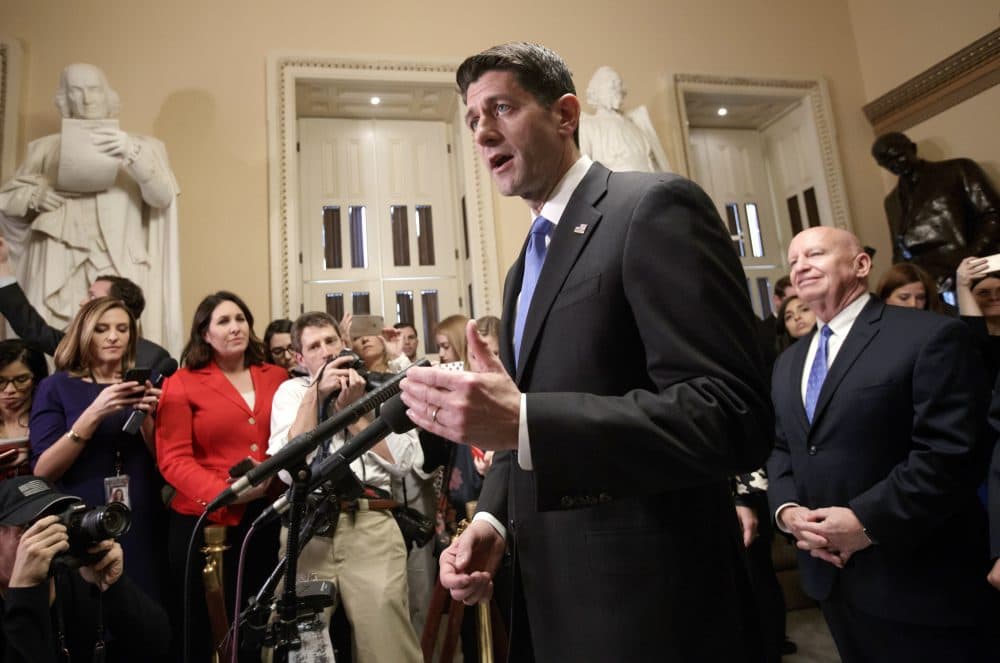Advertisement
Commentary
There's Nothing Conservative About The Republican Tax Bill

"How The Grinch Stole Christmas" is playing out in Washington, D.C., this Christmas and for many Christmases to come.
Headlines proclaim that the tax bill the GOP-led Congress is poised to pass will be the only legislative gift in Donald Trump's Christmas stocking this year. But everything tax reform should do -- especially conservative tax reform -- is absent from this bill. It won’t help and may even hurt many average Americans. Dr. Seuss would not approve.
First, any reform deserving of the adjective “conservative” would do a root-to-flower simplification of the tax code, something conservative economists have long pitched: pruning its 70,000-plus pages to just a few, with a postcard-sized return and most deductions, credits and breaks deep-sixed. Yet under the new law, The Wall Street Journal predicts, “Tax professionals won’t lack for business.”
The personal deduction will almost double, indeed simplifying returns for as many as half of the 45 million people who currently itemize their deductions, according to the Journal. But the bill also creates rules under which owners of “pass-through” businesses, including partnerships and S corporations (whose owners report business income on their personal returns and are taxed at their personal rate), will get a tax cut if they play the income-reporting game the right way.
“The lower rate on pass-through income would mean that, for the first time, the wages earned by many employees will be taxed at higher rates than the net income of business owners,” writes the Journal. “The overhaul’s sponsors hope the tax cuts for businesses will spur economic growth. Many tax specialists worry they will spur complex gaming by taxpayers, who will try to reorganize businesses to take maximum advantage of the tax changes."
Second, conservative tax reform would not swell the national debt. The 1986 tax bill signed by Ronald Reagan, the lodestar for true reformers, made a point of revenue neutrality, neither boosting nor slashing Uncle Sam’s tax collections. By contrast, this year’s bill will add at least $1 trillion to the national debt over the next decade.
...truly conservative tax reform would not swell the national debt.
As for Trump administration claims that economic growth from the tax cuts will pay for themselves without adding to our debt, economists have a technical word for such promises: hogwash. Nonpartisan analysts find that, even assuming the bill gooses the economy, it’s still not revenue neutral.
We’ve been down this road before. Similar promises after Reagan’s 1981 tax bill proved to be a strawman, requiring the president and Congress to claw back many of the cuts they’d enacted.
Third, economic inequality is the overarching domestic issue of our era, including Bernie Sanders and David Brooks among its broad ideological chorus.
The bill cuts corporate taxes, though any potholes in our economy today can’t plausibly be blamed on high business levies. Many businesses pay less than the legally set rate by gaming the tax code’s numerous loopholes. And having accumulated $2.3 trillion of cash reserves, corporations aren’t hurting.
Advocates claim the bill also cuts taxes for the middle class. They don’t mention that the legislation’s individual tax cuts phase out over the next decade, while cuts to corporate taxes and inheritance taxes (the latter affecting the very rich) are permanent.
Meanwhile, the GOP has pointed its lances at the social safety net; the tax bill repeals the individual mandate in Obamacare that requires all Americans to have insurance. While not the death blow Republicans have tried to deal the law, the repeal is projected to reduce coverage by 13 million people in the next 10 years. In his bid to make the Chutzpa Hall of Hypocrisy, House Speaker Paul Ryan says Republicans will target anti-poverty and health care spending next year because the deficit (they just bloated by $1 trillion) is getting too big.
While it cuts taxes on the wealthy, Republicans make no pretense of helping the working class. With rampant inequality confronting the country, the GOP’s tax overhaul is a rewrite of the Grinch story. This time, the Grinch doesn’t return the presents.
